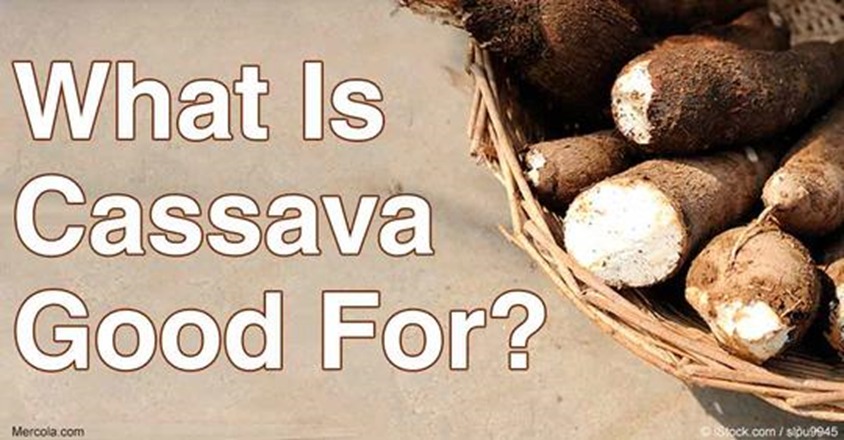By Prof. Raphael Nyarkotey Obu
A recent study by Abdullah et al.(2022) found that Cassava root is mainly high in vitamin C, an important vitamin that acts as an antioxidant, supports collagen production, and enhances immunity, among other benefits. The National Health Institute (2021) also found that cassava is rich in copper, a mineral necessary for neurotransmitter synthesis, energy production, iron metabolism, and more.
Nutritional Profile of Cassava
Hussein et al.(2012) study found that Cassava contained the following: Protein 0.35-2.45%, ash (0.15-1.50%), fat (0.12-0.61%), fiber (0.01- 0.20%), carbohydrate (81.81-90.37%) and dry matter (81.792.69%).
According to https://fdc.nal.usda.gov/(2020), a 3.5-ounce (100-gram) serving of cooked cassava root contains 191 calories. This means that 84% comes from carbs, while the rest comes from protein and fat. Additionally, one serving also provides some fiber and a few vitamins and minerals.
I provide a summary of the following nutrients present in 3.5 ounces (100 grams) of cooked cassava according to the U.S. Department of Agriculture (2020):
• 330 calories
• 78.4 grams of carbohydrates
• 2.8 grams of protein
• 0.6 gram fat
• 3.7 grams fiber
• 42.4 milligrams vitamin C (71 percent Daily Value)
• 0.8 milligram manganese (40 percent DV)
• 558 milligrams potassium (16 percent DV)
• 55.6 micrograms folate (14 percent DV)
• 0.2 milligram thiamine (12 percent DV)
• 43.3 milligrams magnesium (11 percent DV)
• 0.2 milligram copper (10 percent DV)
• 1.8 milligrams niacin (9 percent DV)
• 0.2 milligram vitamin B6 (9 percent DV)
• 0.1 milligram riboflavin (6 percent DV)
• 55.6 milligrams phosphorus (6 percent DV)
• 3.9 micrograms vitamin K (5 percent DV)
• 0.7 milligram zinc (5 percent DV)
Cassava, resistant starch
The Healthy Home Economist (2016) also calls cassava-resistant starch “the healthiest starch for your gut:” What does this mean to our health? They had this to say:
“Resistant starch is a type of starch that does not break down (it literally “resists” digestion), instead of being absorbed as glucose like most starches. Instead, resistant starch travels through the small intestine to the colon where it is turned into beneficial, energy-boosting, inflammation-squashing, and short-chain fatty acids by intestinal bacteria. The main reason why resistant starch is so beneficial is that it feeds the friendly bacteria in your colon, turns them into important short-chain fatty acids, such as butyrate (known to help reduce inflammation), and is extremely helpful in cases of autoimmunity, IBS, colitis, and allergies.
The Authority Nutrition (2016) also explains:
Most of the carbohydrates in the cassava diet are starches. Starches are long chains of glucose that are found in grains, potatoes, and various foods. But not all of the starch we eat gets digested. Sometimes a small part of it passes through the digestive tract unchanged. In other words, it is resistant to digestion.
According to Topping et al, (2003), resistant starch can be very beneficial. As it feeds beneficial gut bacteria, it can reduce inflammation as well as harmful bacteria. It may also lower your blood glucose level after meals (Diabetes Care 2006), improve insulin sensitivity (Robertson et al. 2005), help manage metabolic syndrome (Bodinham et al, 2010), and possibly help you eat less(Raben et al,1994).
Cassava, the Science
Digestive and colon health
One study by Marandola et al.(2004) found that Cassava may also, by a different mechanism, be protective against cancer because it contains a chemical called tamarin which is responsible for the production of hydrocyanide. This tamarin has been shown in vitro to cause the death of cancer cells by self-toxicity with hydrocyanide. Another study by Tsumbu et al.(2011) found that Cassava Leaves, roots show promise against colon cancer. Irabor (2011) found that the low colon cancer in Nigeria could be due to the consumption of resistant starch foods.
Cassava and Prostate Cancer?
Two case studies were reported by Abeygunasekera and Palliyaguruge(2013) which found that patients with hormone-resistant prostate cancer whose serum PSA level continued to rise despite consumption of large quantities of boiled roots of cassava indicating its ineffectiveness in controlling prostate cancer. Though they recognized that this is a single case, it guides healthcare workers who look after patients with castration-resistant prostate cancer in the absence of more comprehensive research on cassava and its effectiveness on prostate cancer. Take note that this case report was based on patients with hormone-resistant prostate cancer.
This means that the science is not strong to back the claim that cassava cures prostate cancer. Besides, the claim that linked this to the Vitamin B-17 content is not strong enough and could worsen your prostate cancer outlook.
Promotes Wound Healing
According to fdc.nal.usda.gov, Cassava is loaded with vitamin C, with 20% of the Daily Value in each 3.5-ounce (100-gram) serving. Other studies found that cassava provides about 50% of the daily vitamin C needs for most adults.
Vitamin C plays a key role in many aspects of health, including immunity. Carr and Maggini(2017) study found that vitamin C can help protect against oxidative stress and support the function of immune cells in your body.
Reduce Blood Pressure
Compare to potatoes, cassava is exceptionally high in potassium. A cup of cassava has 558 milligrams, providing 16% to 21% of the daily recommendation, which ranges between 2600–3400 milligrams per day depending on age and sex.
Filippini et al.(2020) study found that Potassium lowers blood pressure levels and can help balance out sodium intake which raises blood pressure. Choosing a cassava-based side dish instead of a grain-based one boosts the potassium intake of your meal.
Cassava is rich in flavonoids and fiber that can protect against the development of metabolic syndrome and its associated complications. This claim is especially true when cassava replaces wheat as a staple food(Nwose et al.2017).
Weight Management
One may be mistaken for thinking that due to the high calories in cassava, it may not be appropriate for weight management. However, don’t forget that cassava provides fiber and resistant starch that promotes healthy gut bacteria.
This has been confirmed by Hiel et al.(2019) who found that the fiber from root vegetables reduces cravings for salty, sweet, and high-fat foods. The fiber in cassava also positively impacts the gut microbiome, promoting feelings of satiety.
Negative Aspect
High calories
U.S. Department of Agriculture (2020) found that Cassava contains 191 calories per 3.5-ounce (100-gram) serving, which is high compared with other root vegetables. If one juxtaposes the same institution’s work, you will notice that sweet potatoes have 90 calories, while the same amount of carrots has 35 calories. The high-calorie amount is what makes it a significant main crop in several countries. Be warned that eating too many calories than you burn can add to your weight gain( Osilla et al. 2021).
Harmful?
Two studies (Zidenga et al.2017; Cressey and Reeve 2019) found that raw cassava contains chemicals called cyanogenic glycosides. Hence, if one consumes it raw, it is likely to release cyanide into the body.
Hence, two studies( Tshala-Katumbayet al. 2016; Alitubeera et al. 2019) affirmed that eating raw cassava daily is likely to increase cyanogenic glycosides or cyanide poisoning. They further had this to say: “Cyanide poisoning is associated with impaired thyroid and nerve function, paralysis, organ damage, and even death.”
This notwithstanding, Odoemelam et al.(2020) study explains that because protein helps rid the body of cyanide, those with poor nutritional content and low protein faced these challenges.
However, these effects can be mitigated by Soaking and cooking cassava. Additionally, we can also mitigate this by infusing cassava with other diets found to contain high protein (Alitubeera et al. 2017; Odoemelam et al. 2020)
The processing affects the nutritional Profile
Another interesting thing is that the nutritional profile of cassava can be affected by processing such as peeling, chopping, and cooking. However, a study by Julie et al.(2009) found that though cooking affects the nutritional content, cooking cassava before consumption is important to avoid side effects.
Julie et al. (2009) additionally found that boiling cassava root still retains more nutrients, compared with other cooking methods like roasting or frying. The exception is vitamin C, which is sensitive to heat and easily leaches into the water.
This means that our traditional processing forms of cassava such as Tapioca, gari, and fufu are likely to reduce their nutritional value. Additionally, cooking is still a less processed technique to provide nutritional value.
Take Home
Cassava is loaded with 50% vitamin C, which boosts the immune system. It is further enriched with high Potassium which reduces high blood pressure. Cassava should not be consumed raw but always cooked. Finally, assess your needs first and understands how your body responds to diet. There is no one size fits all approach to diet.
NB:
Prof. Nyarkotey has strict sourcing guidelines and relies on peer-reviewed studies, academic research institutions, and medicalassociations to justify his write-ups. My articles are foreducational purposes and do not serve as Medical advice forTreatment. I aim to educate the public about evidence-based scientific Naturopathic Therapies.
The author is a Professor of Naturopathic Healthcare and President of Nyarkotey College of Holistic Medicine &Technology (NUCHMT)/African Naturopathic Foundation. E-mail: collegeofholisticmedicine@gmail.com.




